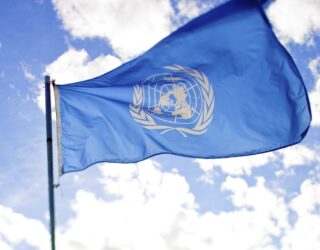John Chilcot’s statement on the release of the Iraq Inquiry’s report described it as an “account of an intervention that went terribly wrong”. He said: “It is now clear that policy on Iraq was made on the basis of flawed intelligence and assessments”. Blair presented intelligence about Iraq’s weapons of mass destruction “with a certainty that was not justified”. While just an insight into the findings of the 2.6 million word report, it provides a vital snapshot of what may lie ahead.
In the lead-up to the long-awaited Chilcot report, the International Criminal Court (ICC) publicly declared that they will not pursue war crimes charges against its primary subject, former Prime Minister Tony Blair. This decision has been met with outrage from countless angles. The pacifist left is horrified that there will be no consequences for a man who lied as loudly and proudly as George W. Bush and led his country needlessly to a war that killed at least 150,000 civilians, displaced nearly 2,000,000 more, killed thousands of UK, US and Iraqi troops and directly led to the destabilization of the Middle East that allowed the rise of IS and, indirectly, to the global refugee crisis.
The ICC is deeply colonialist in practice, despite the inclusiveness of its construction
More patriotic poppy-wearing types are (reasonably) disgusted that soldiers will be considered for war crimes trials while the man who sent them to war will walk away not just free but famous and rich. Everyone is outraged with the ICC, and the middle ground is held by a faction furious about both. In fact, the only elements who seem pleased with the decision are militaristic anti-internationalists who oppose the existence of international courts in the first place.
The ICC has long been seen by the public at large as an imperfect but necessary tool of international justice. It sits in the background, threatening world leaders not to overstep their bounds, keeping the world order ostensibly safe in the minds of public supporters of liberal democracy. But every time the court makes any kind of decision whatsoever, from the decision to halt their investigation in Darfur to acquitting the leader of the National Integration Front of the Democratic Republic of the Congo to the court’s Yugoslav Tribunal’s light sentence visited upon Bosnian Serb leader Radovan Karadzic, this illusion is shattered.
“To date, the International Criminal Court does not have jurisdiction over ‘acts of aggression’”
The ICC is, additionally, deeply colonialist in practice, despite the inclusiveness of its construction. In its 20 years of existence, the ICC has opened investigations into 10 conflicts, 9 of which were African. From these investigations, arrest warrants have been issued to only 31 people, every single one of them African. Additionally, every single ICC field office is in Africa, with only the HQ in Europe. The ICC has only ever issued 4 verdicts: 3 were guilty, one had the charges dropped.
But neither the colonialism nor our disappointment is the fault of the ICC itself. The Court is quite honest about its own limitations, declaring on its web page “As a court of last resort, it seeks to complement, not replace, national Courts. Governed by an international treaty called the Rome Statute, the ICC is the world’s first permanent international criminal court.” It most certainly can’t replace the courts of those countries who sit on the United Nations Security Council, who control the ICC’s budget and exert outsize political control over their actions.
Dr Mark Ellis, executive director of the London-based International Bar Association highlighted on the day of the Chilcot reports release that:
“The overwhelming evidence is that neither of… [the exceptions allowing the use of force in international relations were present] and, consequently, the invasion of Iraq violated international law. Yet, international law has not progressed to a stage where those who breached these legal principles will be brought to justice. To date, the International Criminal Court does not have jurisdiction over ‘acts of aggression’. The only body able to initiate sanctions against states that trigger these acts is the UN Security Council. However, both the United States and Great Britain, as permanent members of the council, would never consent to such sanctions.”
Further, the ICC also has very limited jurisdiction over those countries who are non-signatories to the Rome Statute, including the primary aggressor in the invasion of Iraq, the United States of America. As Human Rights Watch explained:
“[The ICC] will have no jurisdiction over crimes committed on U.S. soil unless the United States ratifies its treaty. Second, the Prosecutor will not be able to begin an investigation without authorization from a Pre-Trial Chamber of Judges. At that point, if a U.S. citizen were accused of a crime, the court’s judges would be obliged, upon request, to defer to U.S. justice, standing down for at least six months while the United States pursued its own investigation and, if appropriate, prosecution. After that period, the judges would be able to authorize investigations only if they decided that the U.S. judicial system was willfully obstructing justice – a very high threshold. Any indictment would also require confirmation by a Pre-Trial Chamber of Judges. Finally, the U.N. Security Council can adopt a resolution suspending the ICC from investigating or prosecuting any case.”
The US was actually a signatory to the Rome Statute until George W. Bush withdrew the country in May 2002, a questionably short time before the invasion of Iraq. The strength of American opposition to the court got progressively stronger as the invasion of Iraq grew nearer, and in August 2002 Bush signed a law that permitted American forces to invade The Hague if an American (politician or military serviceperson) or American-allied citizen (read: NATO member states, especially British) was ever brought there against their will. Despite his internationalist rhetoric, the Obama administration has not reversed either of these decisions.
If we desire more than a colonial show trial, it is on us to overhaul our own nation’s approaches
So, Americans can’t be tried, and the protection extends to the British as our countries threaten military action at the merest threat of our being held to the same standard of justice to which we hold the rest of the world (which also negates the fears of the Poppy Brigade that British soldiers could be tried). The ICC is very honest about their limitations, and long-term observers and activists know that it’s not the Court’s fault. Yet we spew our vitriol at the ICC when it is we, the American and British public, who are at fault for allowing this governing system of global Anglophonic imperialism to reign. It is we who simply take at face value the concept that the ICC has any effect whatsoever on acts of international aggression despite the Court telling us outright that this is outside its purview.
The rage over the decision not to try Tony Blair is in fact rage over our own ignorance. If we desire anything more from international justice than a colonial show trial, it is on us to ensure that we overhaul our own nation’s approaches in that direction. But in this very moment, we might actually have the power to do so.
The White Supremacy of the concept that Africans can be war criminals but that “The West” only engages in “Just Wars” for the “the greater good” is embedded within international legal frameworks to allow the transatlantic alliance to literally get away with murder, and this supremacy is a keystone of American and English exceptionalism. There is still hope ahead however.
The same opposition to this exceptionalism that brought us Jeremy Corbyn and Bernie Sanders can be used to fight back and strengthen mechanisms of international justice. With the coup against Corbyn being outright Chilcot-based according to Salmond and others, and with Bernie’s delegates having a place at the DNC table, Corbyn and Sanders supporters should use their energy to push for:
- The creation of national tribunals to deal with the international war crimes of their countries’ leaders with the provision that, in the event of a guilty or not-not-guilty verdict these leaders would be sent to the Hague to face international charges.
- Or a strengthened transatlantic commitment to the ICC itself, allowing it to tackle its own lopsidedness by trying American and British citizens.
As Corbyn’s supporters fight to keep him as leader against a Blairite coup, they should make this a major platform, in light of its alleged attempt to shield Blair from charges. Sanders delegates to the DNC should push to ensure that the Democrats include a national war crimes tribunal as a policy platform in the 2016 general election, especially to put themselves in direct contrast to the Republican debates which were largely a competition of who would commit the gravest war crimes as Commander in Chief, and with the practical benefit of having something in place to deal with domestic war crimes should Donald Trump actually become President. This tribunal should exemplify not just Abu Ghraib and soldiers but also diplomats and politicians against whom war crimes charges have been proposed, such as Henry Kissinger and Madeline Albright.
If you’re dissatisfied with double standards in international justice, don’t whine about the ICC. The only way change will come is if you take action at home, within the heart of the empire.
Additional reporting from Shane Boothby.
Image: Center For American Progress



